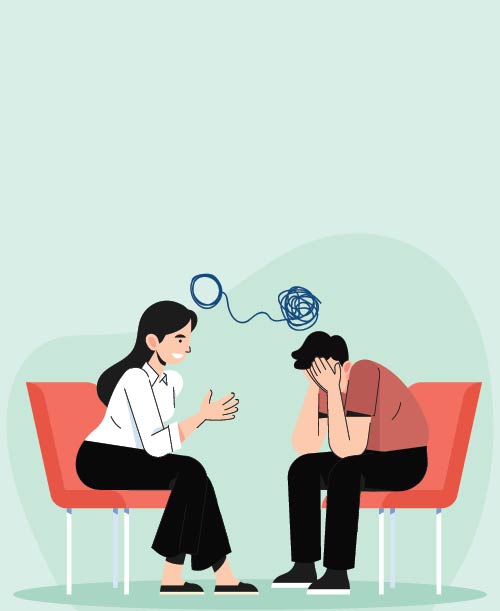How Marriage Counselling Can Help Heal Emotional Distance
Wiki Article
The Relevance of Mental Health: a Deep Study Counseling, Therapy, and Their Benefits
Mental wellness greatly forms specific well-being, affecting ideas, habits, and emotions. Therapy and therapy function as vital opportunities for healing and personal advancement. They offer organized assistance, aiding people navigate life's obstacles. Yet, lots of stay not aware of the details kinds of treatment readily available and their special benefits. Understanding these elements is necessary for any individual considering specialist mental wellness assistance. What follows may light up courses to durability and gratification that numerous ignore.Recognizing Mental Health And Wellness and Its Influence
Although mental health is usually neglected, it plays a necessary role in general health and day-to-day performance. It incorporates psychological, psychological, and social variables that affect how individuals think, really feel, and behave. A person's mental health directly impacts their capacity to take care of anxiety, associate with others, and choose. Poor mental health and wellness can lead to numerous issues, including anxiety, anxiety, and problem in preserving relationships, all of which can impede expert and personal growth.Furthermore, psychological wellness has far-ranging ramifications for physical health and wellness. Chronic tension and neglected mental conditions can contribute to different physical disorders, such as heart illness and compromised immune reactions. Conversely, favorable psychological wellness promotes resilience, allowing people to handle life's difficulties properly. Comprehending mental health and wellness's value is crucial for cultivating helpful environments that advertise psychological wellness, thus improving the quality of life for communities and individuals alikeThe Various Kinds Of Counseling and Therapy
In the domain name of mental health, various therapy and therapy types provide to diverse requirements. Individual counseling strategies concentrate on individual concerns through one-on-one sessions, while team treatment characteristics foster shared experiences and assistance among participants. Recognizing these techniques is important for choosing the ideal intervention for various challenges.Private Therapy Approaches
Many specific therapy approaches exist, each designed to address particular mental health worries and accommodate differing client demands. Cognitive Behavior Modification (CBT) concentrates on determining and changing unfavorable thought patterns, while Psychodynamic Treatment explores past experiences and subconscious procedures. Humanistic Treatment stresses individual growth and self-actualization, promoting a helpful setting. Interpersonal Treatment (IPT) targets connection issues and communication patterns to enhance emotional health. Furthermore, Approval and Dedication Treatment (ACT) motivates customers to approve their ideas and sensations while devoting to personal worths. Each method uses one-of-a-kind techniques and viewpoints, enabling specialists to tailor their techniques to the individual, thereby boosting the restorative experience and advertising psychological health healing.Team Treatment Dynamics
Team therapy characteristics encompass different healing methods that utilize the power of shared experiences and social relationships. This kind of therapy commonly consists of varied groups, fostering a safe environment for participants to reveal sensations and thoughts. Key sorts of team treatment include support teams, which offer psychological assistance; process-oriented groups, concentrating on interpersonal communications; and psychoeducational teams, targeted at presenting knowledge regarding psychological health concerns. The characteristics within these teams can improve self-awareness, as participants often review their behaviors in connection with others. Furthermore, team treatment cultivates a sense of belonging, reducing feelings of seclusion. Through shared stories and collective problem-solving, participants can create dealing methods and gain understandings, eventually adding to individual growth and healing.The Duty of Therapy in Mental Health
Counseling plays a necessary role in psychological health by offering different approaches customized to specific requirements. These methods offer professional advice that can bring about substantial renovations in psychological well-being. Understanding the various kinds of counseling can aid individuals make notified decisions about their psychological wellness care.
Types of Therapy Approaches
While numerous counseling approaches exist, each offers special approaches and insights into psychological wellness treatment - Mental Health Resources. Among one of the most famous are cognitive-behavioral therapy (CBT), which concentrates on altering unfavorable thought patterns; psychodynamic treatment, which checks out subconscious procedures and childhood years experiences; and humanistic strategies, stressing personal development and self-actualization. Furthermore, solution-focused short treatment prioritizes discovering options in the existing instead of diving into troubles. Team treatment fosters neighborhood and shared experiences, while family members treatment addresses relational characteristics within familial frameworks. Each approach satisfies various requirements, aligning with private choices, issues, and restorative objectives. Understanding these strategies helps customers make educated choices about their mental health and wellness trip and advertises efficient therapy tailored to their unique circumstancesBenefits of Specialist Advice
Many people take advantage of specialist support in managing their psychological health and wellness obstacles. Counseling provides a secure room for clients to explore their ideas and sensations without judgment. This restorative atmosphere cultivates self-awareness, enabling people to identify patterns in their habits and create much healthier coping techniques. Professional guidance additionally offers access to evidence-based strategies that can alleviate symptoms of anxiousness, depression, and other psychological health and wellness problems. Moreover, therapists can aid in setting practical goals and provide assistance in attaining them, boosting overall well-being. The collective partnership in between therapist and customer is vital, as it promotes liability and motivates individual development. Inevitably, professional assistance plays an essential role in steering mental wellness trips, bring about improved psychological strength and life fulfillment.Benefits of Therapy: Recovery and Growth

Just how to Select the Right Therapist or Counselor
Just how can one navigate the commonly overwhelming process of choosing the ideal therapist or therapist? Recognizing individual needs is vital; people need to consider their specific issues, whether partnership, anxiousness, or clinical depression difficulties. It is advantageous to research study numerous therapeutic methods, such as cognitive-behavioral therapy or psychodynamic therapy, to find an visit the site ideal match.Next, potential clients need to look for recommendations from trusted sources or use online directories. It is critical to evaluate therapists' credentials, including their education, licensing, and areas of field of expertise. Setting up initial consultations can assist evaluate compatibility, allowing people to examine interaction designs and individual comfort.Finally, logistical factors, such as area, availability, and charges, need to likewise be taken into consideration. By thoughtfully evaluating these elements, one can make an informed decision, inevitably promoting a restorative connection that supports psychological health and wellness and personal growth.Conquering Stigma: Welcoming Mental Wellness Support
While social perspectives toward psychological wellness have evolved, stigma still provides a significant barrier for several looking for support. This stigma frequently shows up as misunderstandings surrounding psychological disease, leading individuals to feel shame or concern regarding their battles. Many individuals wait to go after therapy or treatment because of stress over being evaluated or classified. Overcoming this stigma is basic for promoting a helpful atmosphere where people can openly discuss their psychological health needs.Communities and organizations play a crucial function in this improvement by advertising awareness and education and learning regarding mental health problems. Efforts that highlight individual stories can humanize these experiences, encouraging others to look for help without concern. As approval expands, people may really feel a lot more empowered to embrace psychological wellness support, acknowledging it as an important facet of overall well-being. By taking down preconception, society can cultivate a society of understanding, empathy, and proactive psychological healthcare.Strategies for Maintaining Psychological Health Outside of Treatment
Treatment provides valuable support, preserving psychological health outside of sessions is equally essential. Individuals can carry out a number of approaches to maintain their psychological health. Regular physical activity plays an important duty, as workout promotes the release of endorphins, which improve mood. In addition, a balanced diet rich in nutrients can greatly impact emotional security and power levels.Practicing mindfulness and reflection aids people manage stress and develop higher use this link self-awareness. Establishing a regular rest routine is also basic, as high quality rest is essential for cognitive function and psychological regulation.Engaging in social tasks fosters link and minimizes sensations of isolation. Going after rate of interests or pastimes can give a creative electrical outlet and boost self-confidence. Lastly, establishing sensible goals and practicing self-compassion permits individuals to cultivate strength. By integrating these approaches right into life, individuals can efficiently support their mental wellness past therapy sessions.Often Asked Concerns

Just How Can I Inform if I Need Treatment?
Determining the need for therapy usually includes recognizing consistent feelings of sadness, anxiety, or frustrating stress and anxiety. If daily functioning comes to be challenging or coping systems fail, looking for professional support might be an advantageous action onward.
What Should I Expect in My First Treatment Session?
In the first therapy session, people can anticipate an intro, discussion of their factors for looking for help, and a review of the specialist's strategy, producing a structure for future discussions and establishing convenience in the restorative space.Are Online Treatment Sessions as Effective as In-Person Ones?
Study shows that online therapy sessions can be as reliable as in-person ones. Aspects such as the therapist's certifications, client engagement, and the restorative connection significantly influence end results, despite the medium made use of.Can Therapy Assist With Relationship Issues?
Therapy can help individuals in resolving relationship problems by providing devices for communication, comprehending emotions, and solving problems. Cognitive Behavioural Therapy. It promotes healthier characteristics and encourages individual development, ultimately promoting more powerful, much more fulfilling connections between partnersFor How Long Does Treatment Typically Last?
Therapy duration varies significantly based upon private demands and objectives. Generally, sessions might last from a couple of weeks to several months, with some individuals participating in continuous therapy to attend to long-term concerns and personal growth. Cognitive Behavioral Therapy (CBT) focuses on determining and altering negative thought patterns, while Psychodynamic Treatment discovers unconscious processes and past experiences. Secret kinds of group therapy include assistance teams, which supply emotional assistance; process-oriented teams, concentrating on social communications; and psychoeducational teams, intended at presenting knowledge about mental wellness concerns. Among the most popular are cognitive-behavioral therapy (CBT), which concentrates on modifying adverse idea patterns; psychodynamic therapy, which explores unconscious procedures and childhood experiences; and humanistic strategies, emphasizing individual development and self-actualization. Group therapy promotes neighborhood and shared experiences, while household therapy addresses relational characteristics within domestic frameworks. It is helpful to study numerous restorative methods, such as cognitive-behavioral treatment or psychodynamic therapy, to find an appropriate match.Next, potential customers ought to look for recommendations from trusted sources or use on the internet directories.Report this wiki page